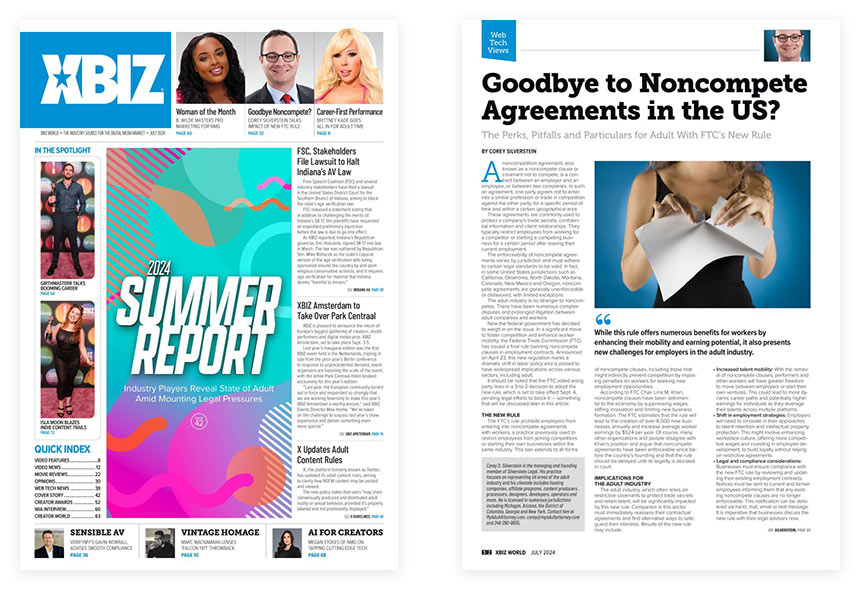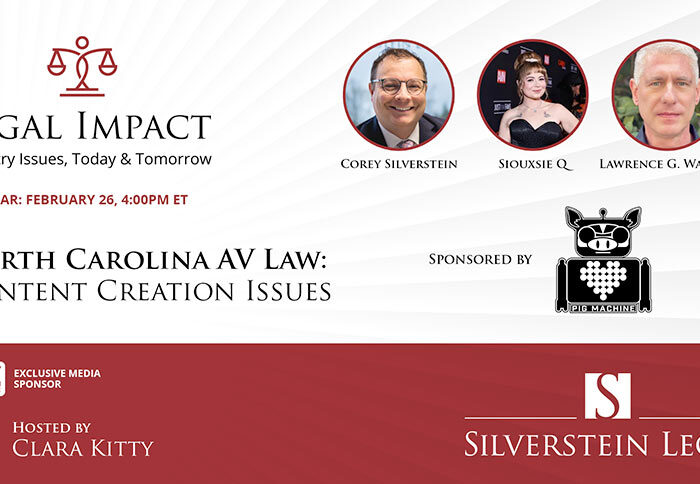Cyberspace (February 4, 2026) - Corey D. Silverstein, the driving force behind MyAdultAttorney.com and Adult.Law,…

A non-competition agreement, also known as a non-compete clause or covenant not to compete, is a contract between an employer and an employee, or between two companies, where one party agrees not to enter into or start a similar profession or trade in competition against the other party for a specific period of time and within a certain geographical area.
Featured In The July 2024 Edition Of XBIZ World

These agreements are commonly used to protect a company’s trade secrets, confidential information, and client relationships. They typically restrict employees from working for a competitor or starting a competing business for a certain period after leaving their current employment.
The enforceability of non-compete agreements varies by jurisdiction and must adhere to certain legal standards to be valid. In fact, in some United States jurisdictions such as California, Oklahoma, North Dakota, Montana, Colorado, New Mexico and Oregon, non-compete agreements are generally unenforceable, or disfavored, with limited exceptions.
The adult industry is no stranger to non-competes and numerous adult businesses have been the subject of many complex disputes and prolonged litigation between adult entertainment companies and workers for years.
The United States Federal government has decided to weigh in on the issue and in a significant move to foster competition and enhance worker mobility, the Federal Trade Commission (FTC) has issued a final rule banning non-compete clauses in employment contracts. Announced on April 23, 2024, this new regulation marks a dramatic shift in labor policy and is poised to have widespread implications across various sectors, including the adult entertainment industry. The FTC’s announcement of the new rule can be found here.
It should be noted that the FTC voted in a 3 to 2 decision (along party lines) to adopt its new rule. The rule is scheduled for publication in the Federal Register on May 7, 2024, giving the rule an Effective Date of September 4, 2024, pending any efforts to block the rule (which will be discussed later in this article).
The New Rule
The FTC’s rule prohibits employers from entering into non-compete agreements with workers, a practice previously used to restrict employees from joining competitors or starting their own businesses within the same industry. This ban extends to all forms of non-compete clauses, including those that might be indirectly preventing competition by imposing penalties on workers for seeking new employment opportunities.
According to FTC Chair Lina M. Khan, non-compete clauses have been detrimental to the economy by suppressing wages, stifling innovation, and limiting new business formation. The FTC estimates that the rule will lead to the creation of over 8,500 new businesses annually and increase average worker earnings by $524 per year. Of course, many other organizations and people disagree with Ms. Khan’s position and argue that non-compete agreements have been enforceable since before the country’s founding and the rule should be delayed until its legality is decided in the court.
Implications for the Adult Entertainment Industry
The adult entertainment industry, which often relies on restrictive covenants to protect trade secrets and retain talent, will be significantly impacted by this new rule. Companies in this sector must reassess their contractual agreements and find alternative ways to safeguard their interests immediately.
Increased Talent Mobility – With the removal of non-compete clauses, performers and other workers within the industry will have greater freedom to move between employers or start their own ventures. This could lead to more dynamic career paths and potentially higher earnings for individuals as they leverage their talents across multiple platforms.
Shift in Employment Strategies – Employers will need to innovate in their approaches to talent retention and intellectual property protection. This might involve enhancing workplace culture, offering competitive wages, and investing in employee development to build loyalty without relying on restrictive agreements.
Legal and Compliance Considerations – Businesses must ensure compliance with the new FTC rule by reviewing and updating their existing employment contracts. Notices must be sent to current and former employees informing them that any existing non-compete clauses are no longer enforceable. This notification can be delivered via hand, mail, email, or text message. It is imperative that businesses discuss the new rule with their legal advisors now.
Exceptions and Legal Challenges
There are limited exceptions to the rule, such as non-compete clauses associated with the bona fide sale of a business. Additionally, while the rule prohibits new non-competes for senior executives, it allows the enforcement of existing non-competes for this small subset of the workforce.
Legal challenges to the rule have already been mounted. The U.S. Chamber of Commerce and other groups argue that the FTC lacks the authority to enforce such a regulation and that it could lead to government overreach. These challenges are expected to delay the rule’s implementation and could result in further modifications depending on the outcomes in court.
Within hours of the new rule’s announcement, the first lawsuit was filed against the FTC in the Northern District in Texas in Ryan, LLC v. Federal Trade Commission. The United States Chamber of Commerce, the nation’s largest business advocacy group, had announced prior to the new rule’s unveiling that it planned to file suit to block the rule should the Agency vote to ban non-compete agreements. It followed through on its plans in a lawsuit filed in the Eastern District of Texas, Chamber of Commerce of the United States of America, et al. v. Federal Trade Commission. In another lawsuit filed against the FTC, its Chair Lina Khan, and each of the FTC’s commissioners in their official capacities in the Eastern District of Pennsylvania, ATS Tree Services, LLC v. Federal Trade Commission, et al. Each of the lawsuits raise similar challenges to the new rule including that the (1) the FTC lacked or exceeded the statutory authority to issue the Noncompete Rule, (2) the Noncompete Rule is an unconstitutional delegation of legislative power, and (3) the Noncompete Rule is arbitrary and capricious.
Many more legal challenges to the new rule are expected and will undoubtedly involve a prolonged legal process. The legal challenges will most likely lead to injunctions that will at the very least delay the effective date of the new rule.
Some Final Words
The FTC’s ban on non-compete clauses represents a significant policy shift aimed at promoting economic freedom and competition. While this rule offers numerous benefits for workers by enhancing their mobility and earning potential, it also presents new challenges for employers in the adult entertainment industry. As the adult industry adapts to these changes, it will be crucial for companies to find innovative ways to attract and retain talent while ensuring compliance with the new regulatory landscape.
The new rule does not explicitly ban confidentiality, non-disclosure agreements, and non-solicitations agreements which I highly recommend adult entertainment businesses understand and utilize.
For more detailed information on the new FTC rule and its implications, visit the FTC’s official announcement, provided earlier in this article, and consult your legal experts immediately.
This article does not constitute legal advice and is provided for your information only and should not be relied upon in lieu of consultation with legal advisors in your own jurisdiction. It may not be current as the laws in this area change frequently. Transmission of the information contained in this article is not intended to create, and the receipt does not constitute, an attorney-client relationship between sender and receiver.
About Silverstein Legal
Founded in 2006 by adult entertainment lawyer Corey D. Silverstein, Silverstein Legal is a boutique law firm that caters to the needs of anyone working in the adult entertainment industry. Silverstein Legal’s clients include hosting companies, affiliate programs, content producers, processors, designers, developers, and website operators.




